The Academy Of Achievement Series: Science, Medicine, Technology And Research. - Science/Technology - Nairaland
Nairaland Forum / Science/Technology / The Academy Of Achievement Series: Science, Medicine, Technology And Research. (971 Views)
Technology And Science Overview, Part 1 / Some People Excel At Technology And Some Don't - Which One Are You? / Good Technology And Machines (2) (3) (4)
| The Academy Of Achievement Series: Science, Medicine, Technology And Research. by TheSuperNerd(m): 6:58am On Mar 25, 2016 |
 Hello Readers, This is a series about some of the many brightest minds to have emerged in the world of science, medicine, technology and Research. Some are names you may never have encountered but have affected the world in one way or another. I trust that these series for the science and technology section alongside its "sister-series" in a few other sections which I'll set up soon will go a long way to inspire minds and enable people take a look into how these top minds came to be so as to draw lessons, knowledge and wisdom that'll ignite a fire for SUPER EXCELLENCE. The series is based on the official induction into the Elite Academy of Achievement present in the United States of America that covers Some of the elite achievers from around the world in various fields especially in the broad areas of Science and Exploration, Business, Public Service, Sports and The Arts. This thread focuses on Science and Exploration only as it is in the science and technology section The other areas will be treated meticulously under the sections that suit them best on this forum.  .............................................................................. The Academy of Achievement usually awards a Golden plate to its elite achievers and are inducted as Elite achievers. THIS HONOR IS OPEN TO ALL SORTS OF BIG TIME ACHIEVERS AROUND THE WORLD BUT OF COURSE, IT'S NOT POSSIBLE FOR ONE ELITE ACADEMY TO RECOGNISE ALL NO MATTER HOW THEY TRY. The Recipients of this honor are quite diverse in nationalities and personalities. ................................................................................ The Golden Plate Award has been presented since 1961 by the Academy of Achievement to approximately 25 guests of honor at the International Achievement Summit. Chosen by the Academy's Awards Council and other distinguished authorities, these men and women of exceptional accomplishment in the sciences, professions, business, industry, arts, literature, sports, entertainment, and public service are acclaimed ... not as winners, but as "representatives of the many who excel."      ...................................................................................... Note: All other "Academy of Achievement series" threads in other sections will make reference to this thread as the "master thread" of the entire series. |
| Re: The Academy Of Achievement Series: Science, Medicine, Technology And Research. by TheSuperNerd(m): 7:23am On Mar 25, 2016 |
To be continued **modified** I'm back to begin the series....  |
| Re: The Academy Of Achievement Series: Science, Medicine, Technology And Research. by primus101(f): 4:53pm On Jun 26, 2016 |
TheSuperNerd: NerdFan: Would you please continue? A little run down on the achievements of the featured awardees would be helpful too. |
| Re: The Academy Of Achievement Series: Science, Medicine, Technology And Research. by TheSuperNerd(m): 9:17am On Dec 24, 2016 |
Sir Tim Berners-Lee: Father of the World Wide Web(www) “The web is not a network of computers, Brief Biography Inventor of the InternetDATE OF BIRTH: June 8, 1955 Timothy Berners-Lee was born in London, England. His mathematician parents, who had worked on the revolutionary Mark I computer, frequently discussed mathematics at home, and encouraged Timothy’s scientific interests. From an early age, he was fascinated by both mathematics and electronics. As a schoolboy, he closely followed the emerging field of transistor technology and built electronic devices to control his model trains. As a physics student at Oxford, Berners-Lee continued to tinker with electronic devices. In his spare time, he painstakingly soldered together his own computer terminal from a discarded calculator, broken television sets and a car battery. His unauthorized use of the nuclear physics laboratory’s mainframe led to his being barred from the system. He had already begun devising his own computer languages, and after graduating with a degree in physics in 1976, he found his services as a computer programmer in immediate demand. 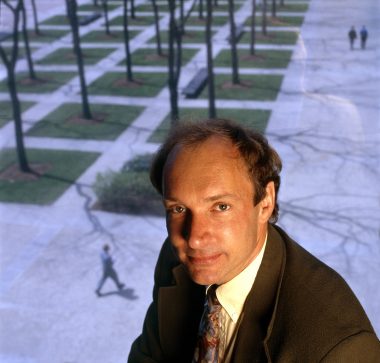 Sir Tim Berners-Lee, inventor of the World Wide Web, at MIT in Cambridge, Massachusetts, where he now teaches. After graduation, Berners-Lee worked for two years with Plessey Telecommunications, one of Britain’s major telecommunications firms. Berners-Lee’s work there included the refinement of bar code technology. The following two years were spent with D.G. Nash Ltd., where he designed typesetting software and a multi-tasking operating system. After working for Nash, Berners-Lee was ready to try his wings as a freelance consultant software engineer, a period that culminated in a six-month stint at CERN, the European particle physics laboratory in Geneva, Switzerland. 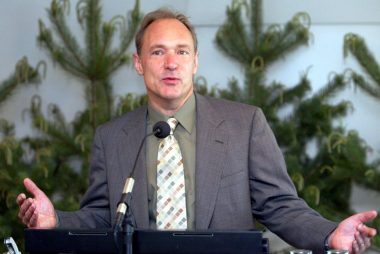 2004: Berners-Lee speaks at a press conference in Helsinki after receiving the Millennium Technology Prize. (Getty) At CERN, Berners-Lee was faced with the daunting task of correlating the sprawling body of research carried out by separate teams, all documenting their work on disparate, incompatible systems. For his own convenience, he devised a software application he called Enquire, based on the concept of “hypertext,” which allowed him to link documents on the basis of single-word associations, rather than through the branching hierarchies of existing systems. Berners-Lee urged his associates at CERN to try Enquire, but found few takers. When his assignment at CERN ended in 1981, Berners-Lee took a job at Image Computer Systems, developing graphics and communications software and a generic macro language. Although CERN had abandoned Berners-Lee’s Enquire program, the young software engineer had made a lasting impression, and in 1984 CERN offered him a fellowship to work on distributed real-time systems for data acquisition and system control. 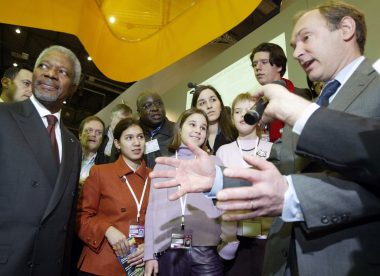 UN Secretary General Kofi Annan and Timothy Berners-Lee meet with schoolchildren during the UN Summit on the Information Society, in Geneva, Switzerland, December 10, 2003. (Jean-Philippe Ksiazek/AFP/Getty Images) On returning to Geneva, Berners-Lee found a more challenging situation than before. The lab had even greater need for a flexible system of sharing research documents. At the time, the Internet, a rudimentary network developed by the Pentagon, was gradually being adopted by researchers around the world for exchanging plain text messages through mail groups. By 1989, CERN was already home to the largest Internet node in Europe, but finding information over the Internet was no easy task. Requests for information had to be sent from one user to another, and replied to individually. Distributing messages to a group, and collecting their feedback, created long documents, with relevant information buried under a blizzard of queries, addresses and replies. Berners-Lee imagined combining the Internet with linked hypertext documents, to provide access to an open-ended body of interactive information. In March 1989, Berners-Lee proposed a global hypertext project, one that would permit researchers all over the world to share work-in-progress, transmitted instantaneously, without the delays associated with traditional scholarly publication or cumbersome mail groups. With collaborators at CERN, Berners-Lee wrote the “hypertext transfer protocol” (HTTP) for transmitting documents over the Internet. HTTP standardizes communication between web servers, where documents are stored, and the client programs, or browsers, used to view them. He also originated a system of identifying documents, originally known as the universal resource indicator, now known as the universal resource locator (URL). 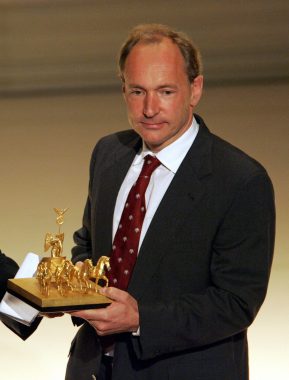 2005: Sir Tim Berners-Lee, receiving the Quadriga award in Berlin. The Quadriga awards are bestowed on the anniversary of German He devised the hypertext markup language (HTML) for formatting web documents, and programmed the first web server to store and transmit them. To make the proposed network visible to the end user, he created the first web browser, an application for both viewing and editing the documents online, which he named WorldWideWeb. He made the entire system available within CERN in October 1990. At first, his invention attracted little notice. On August 6, 1991, he opened his web site (info.cern.ch) to public access over the Internet. He posted instructions for how to set up web servers and create sites, providing all the software he had created, free of charge. He announced his creation through a few Internet mail groups. Word of his invention spread quickly through the international community of computer enthusiasts, who soon set up servers and built web sites of their own. When they sent word of their work to Berners-Lee, he quickly provided links to their sites on his own. With input from an ad hoc army of volunteer collaborators around the world, he continually refined his specifications. The World Wide Web made it possible, not only to link text documents, but to download software and provide access to artwork, photography, audio and video files. 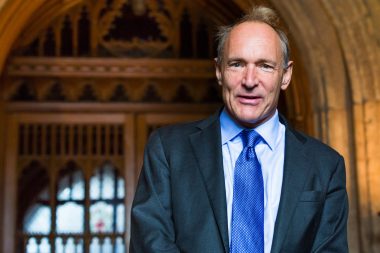 Sir Tim Berners-Lee arriving at the Guildhall to receive the Honorary Freedom of the City of London. (Paul Clarke) Source: http://www.achievement.org/achiever/sir-timothy-berners-lee/ |
| Re: The Academy Of Achievement Series: Science, Medicine, Technology And Research. by TheSuperNerd(m): 9:53am On Dec 24, 2016 |
As web sites serving every possible interest proliferated, use of the web spread beyond the specialized audience of computer specialists to the public at large, and a need arose for browsers that would function on a variety of platforms and operating systems. Software companies created their own applications for browsing the burgeoning web: Mosaic, Netscape Navigator and Internet Explorer. Web users soon found that the competing browsers did not all support the same functions, and Internet service providers looked for ways to control the public’s access to the web. Entrepreneurs approached Berners-Lee with schemes for making a profit on his invention, but from the beginning, Berners-Lee declined all offers. He has always insisted that the web remain an open space, equally accessible to all computer users, without collecting fees for the use of patented software. In 1994, he joined the Laboratory for Computer Science at the Massachusetts Institute of Technology (MIT), where he founded the World Wide Web Consortium (W3C), an international governing body for the web. The Consortium, with teams in the United States, Europe and Japan, coordinates development of web technology among participating companies. It enforces standards based on royalty-free technology, with the goal of keeping the web open and accessible to all, free of domination by any one company or interest. Berners-Lee also holds an endowed chair at MIT’s Computer Science and Artificial Intelligence Laboratory (CSAIL). As a senior research scientist, he heads CSAIL’s Decentralized Information Group. 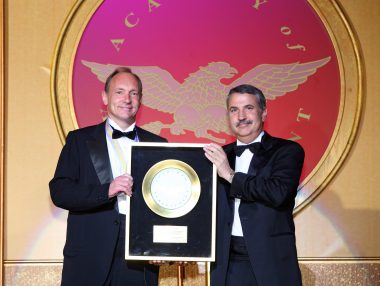 Sir Timothy Berners-Lee receives the Golden Plate Award of the Academy of Achievement from Pulitzer Prize-winning journalist Thomas L. Friedman during the 2007 International Achievement Summit in Washington, D.C. Timothy Berners-Lee recounted the story of the birth of the web, along with his thoughts on its future, in his 1999 book, Weaving the Web. He has received numerous awards and honors for his contribution to civilization. In 2004, he was knighted by Queen Elizabeth II. That same year, he received the first Millennium Technology Prize from the government of Finland, an award of over a million euros. At the end of the year, he also accepted a chair in Computer Science at the University of Southampton, England. Southampton’s School of Electronics and Computer Science is now a major center for the development of Berners-Lee’s vision of the Semantic Web, an extension of the web that will permit search agents to identify links based not only on verbal expressions in written language, but in computer languages as well. 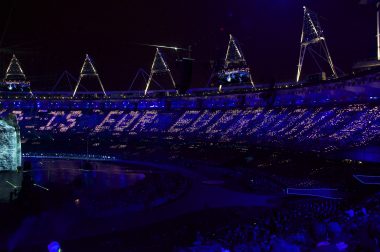 Tim Berners-Lee’s tweet “This is for Everyone” at the 2012 Summer Olympic Games opening ceremony in London. Sir Timothy Berners-Lee remains a leading international advocate of “net neutrality,” preserving the open nature of the World Wide Web. Source: http://www.achievement.org/achiever/sir-timothy-berners-lee/ |
| Re: The Academy Of Achievement Series: Science, Medicine, Technology And Research. by TheSuperNerd(m): 7:46pm On Oct 08, 2017 |
...Still have this thread in mind.  Hopefully, will resume from where I left off.... will take a little while yet to continue but it will happen eventually.. Hopefully a complimentary thread on Mainly Medicine, Hi tech and Science news updates will follow... I love research and the news behind research.... as part of my hobbies, I love to go thru Sports sites and then Science/Research/Medical sites partly dye to who I am and where my central interests lie and what my central dreams and engagements are.... It will all come good By God's Grace.  #MorecomingSoon.... *To be modified when it's time* |
(1) (Reply)
Setup your Call Center Solution/PABX,Conference Calls,Chat and Video Call Setup / See How This Young Lagos Boy Felt After Flying A Drone For The First Time.Photos / After 50 Years Of Existence, What Is Next For ATM
(Go Up)
| Sections: politics (1) business autos (1) jobs (1) career education (1) romance computers phones travel sports fashion health religion celebs tv-movies music-radio literature webmasters programming techmarket Links: (1) (2) (3) (4) (5) (6) (7) (8) (9) (10) Nairaland - Copyright © 2005 - 2024 Oluwaseun Osewa. All rights reserved. See How To Advertise. 44 |